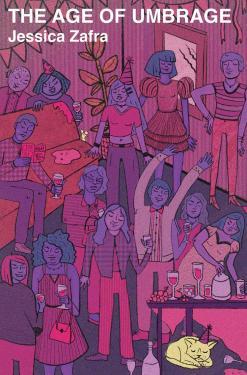When wisdom puts the world's stupidity in its place

 Ataneo
AtaneoJessica Zafra | The Age of Umbrage | Ateneo de Manila University Press | 126 pages | 295 PHP
We can only hope that the upcoming Frankfurt Book Fair, where the Philippines will be guest of honour, will allow Philippine literature to gain more significance and finally begin to reach a readership beyond the country's borders. After all, the Philippines not only boasts a great classic, José Rizal, whose influence even today Caroline S. Hau speaks of in her essay On not reading Rizal. No, the Philippines is also blessed with a contemporary literature that could not be more diverse and exciting, as can be seen in the short stories by Jenny Ortuoste, Daryll Delgado, Bebang Siy, Allan N. Derain and Chuckberry J. Pascual published in Literatur.Review.
For those who would like to delve into the longer format, i.e. a novel, I highly recommend Jessica Zafra's novel A Pretty Bad Girl, published in the Philippines in 2020 under the title The Age of Umbrage, and recently translated into German.
This is Jessica Zafra's literary debut, which is somewhat surprising as Zafra is no stranger to the contemporary Philippine literary scene. The former newspaper columnist and television presenter (and former band manager of the Eraserheads) has built a cult following thanks to her astute observations, which focus primarily on current affairs, literary and film criticism, obscure entertainment trivia and her very particular theory on world domination and the Philippine diaspora.
Zafra's short coming-of-age novel is also characterised by a razor-sharp perspective that dissects Philippine society during the final years of Ferdinand Marcos's regime. A perspective that particularly suits Zafra's young heroine Guada, as she moves from childhood to young adulthood. Through Guada's voice, we experience the self-empowerment and spirit of resistance of a young girl whose ambitious, single mother succeeds in getting a job as a cook with one of Manila's richest families, thus providing her daughter with entirely new educational opportunities. What the mother does not expect, however, is for Guada to embark confidently on her very own path, with her critical, almost cynical and caustic view of a decadent, corrupt society whose fundamental structures are reproduced again and again via the education system.
Guada recalls similar young heroines in recent literature from the global South, who emancipate themselves similarly through education and, above all, literature. The magnificent Silvy from Timor in Felix K. Nesi's The People of Oetimu, for example, or the wonderfully clever Tête Fêlée from the slums of Port-au-Prince in Jean D'Amérique's Torn Sun. Like these young, wild, unpredictable women, Guada also manages to follow her own path, which feels eerily contemporary despite the pre-digital times with no internet or social media, and the declining rule of the dictator Marcos in the mid-1980s, notorious even in the West. Contemporary not just because of this modern, young girl, but also the power politics that seem to be repeating themselves today - Marcos' son Ferdinand Emmanuel "Bongbong" Romualdez Marcos Jr. has been in power since 2022, and we now live in a world in which autocratic, populist forms of government with their neo-colonial progressions are back in vogue all over the world and are even "voluntarily" elected by broad sections of the population.
Zafra's novel, therefore, is not only a deeply empathetic, funny and very ironic book about the coming of age of a young, intelligent girl and the balance between her origins and a future in Manila and a society that could not be more disparate. It is also a book about the complicated dream of the diaspora and a world that seems to mercilessly repeat the same stupid mistakes, no matter how destructive they may be. Or to put it in Zafra's own words:
She kissed Guada on the head and floated out of the chapel without even hearing Tia Maura's protests. That was what money could buy, Guada discovered that day; the power to decide over other people's lives, simply because they could.



